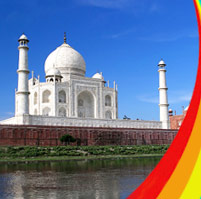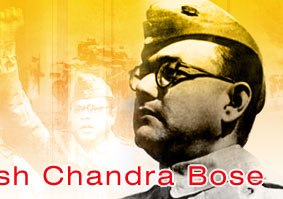Subhash Chandra Bose was born into an affluent
Bengali family on January 23, 1897 in Cuttack, Orissa. Subhash's public
prosecutor father ensured that his son availed the best of education in
eminent institutions such as Scottish Church College, Calcutta and
Fitzwilliam College at Cambridge University. In 1920, at the insistence
of his parents, Bose appeared in the prestigious Indian Civil Service
and secured the fourth place.
During this period the civil disobedience movement called by Mahatma
Gandhi was sweeping across the country and Bose resigned from the ICS in
April 1921 to join his fellow countrymen in the freedom struggle. He
joined the youth wing of the Congress Party and soon rose up the party
hierarchy by virtue of his eloquence and leadership skills. At an early
stage of his life Subhas Bose accepted Deshbandhu Chittaranjan Das as
his political guru.
Over a span of 20 years, Bose was imprisoned eleven times by the
British, the first one being in 1921. In 1924, after a brief period of
incarceration, Bose was exiled to Mandalay in Burma. Subhash Bose was
imprisoned again in 1930 and deported to Europe. During his stay in
Europe from 1933 to 1936, Subhash Bose zealously espoused the cause of
Indian freedom while meeting a number of prominent European statesmen.
In 1937, Bose married Emilie Schenkl who was his secretary.
Subhash Bose was twice elected president of the Indian National
Congress (1938 and 1939) but following his disagreements with Mahatma
Gandhi he relinquished his post and formed a progressive group known as
the Forward Block. The Second World War broke out in 1939 and Bose
launched a campaign of mass civil disobedience to protest against the
Viceroy's decision to declare war on India's behalf. Bose was put behind
the bars but because of his hunger strike he was later placed under
house arrest.
Taking advantage of the laxity of the house guards and aided by his
cousin Sishir Bose, Subhash managed to escape and traversing through
enemy territories he reached Moscow. Bose tried to garner the help Nazi
Germany but due to the indifferent attitude of Hitler and other German
leaders he left for Japan and soon assumed the leadership of Indian
National Army (INA) founded by Rash Behari Bose.
Bolstered by material assistance from the Japanese forces, the INA
attacked the British forces in Manipur and Nagaland in northeastern
India and hosted the National Flag in the town in Moirang, in Manipur.
But with the defeat of Japan, the invasion by the INA soon petered out
and Netaji was forced to retreat to Malaya. Netaji Subhash Chandra Bose
allegedly died in a plane crash over Taiwan, while flying to Tokyo on
August 18, 1945.









